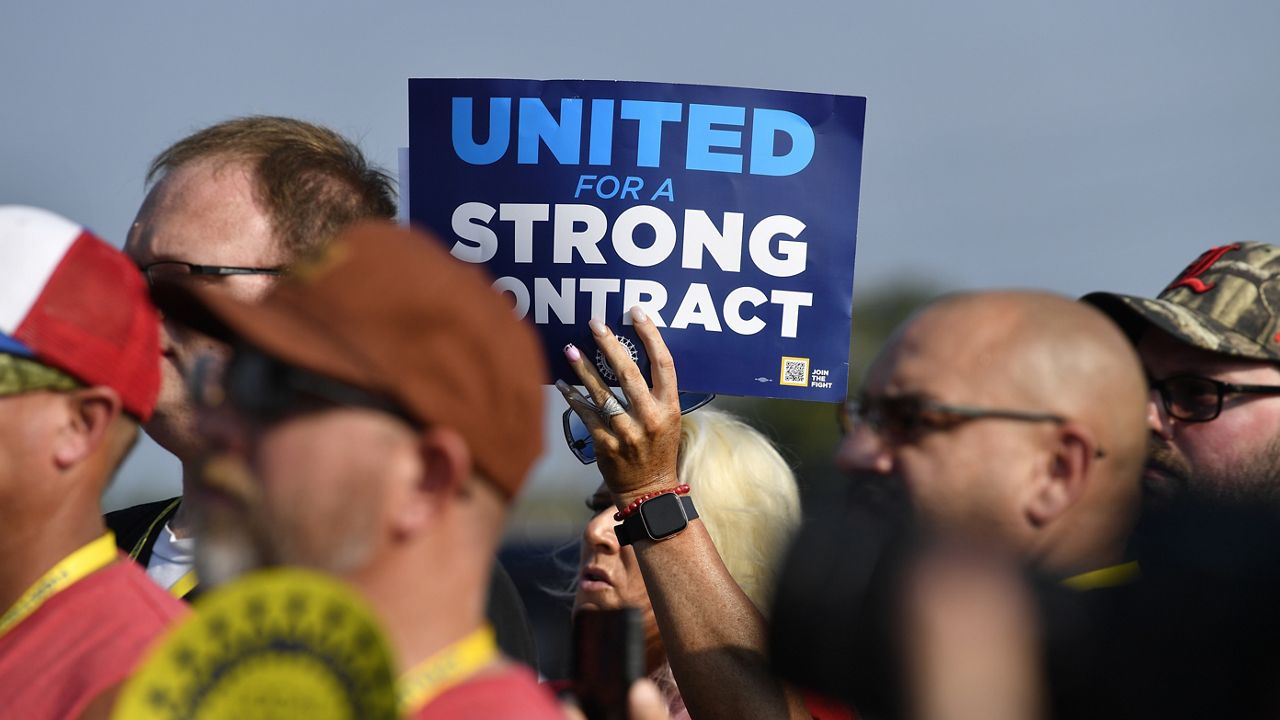As the United Auto Workers strike enters a sixth week, President Shawn Fain said Friday “there is more to be won” from the Big Three Detroit automakers.
Despite new offers from General Motors and Stellantis within the last 24 hours, Fain said in a Facebook livestream with union members, “We’re not going to partner with the Big Three to mask the low standards of the non-union automakers” and pledged to organize non-union auto workers everywhere to stand up and tackle corporate greed.
Fain singled out Ford Motor Company executive chairman Bill Ford, Jr., for comments he made earlier this week saying the UAW strike was “champagne on ice” for Tesla and other major automakers whose workers are not unionized and will benefit from being able to sell vehicles at lower prices.
"Our ability to hold out, to hit the companies economically and to withhold our labor, this is our leverage and this is our path to victory. We have one tool and that's solidarity," Fain said, adding that Ford's plan to distribute an additional $600 million in shareholder dividends this year would equate to a dollar-an-hour raise for all Ford workers for the life of the next contract. "Let me tell you what the companies' path to victory is: fear, uncertainty, doubt and division. Everything they do is in the service of fragmenting our membership."
Hours before Fain’s member update, General Motors made a new offer to increase UAW-represented employee wages 23% over the course of the new contract to $40.39 per hour. GM had previously offered a 20% wage increase. GM’s newest offer includes several concessions to the union’s demands, includes the reinstatement of cost-of-living adjustments for its most senior workers and profit sharing for temporary workers who have put in at least 1,000 hours.
“The offer on the table is the most significant that GM has ever proposed to the UAW and recognizes our team members for all their dedication and contributions,” GM said in a statement. “It is time for us to finish this process, get our team members back to work and get on with the business of making GM the company that will win and provide great jobs in the U.S. for our people for decades to come.”
Fain praised Ford, GM and Stellantis for ending "massive wage tiers" that had paid workers differently for doing the same job and for additional paid holidays and parental leave but said there are still gains to be made with reitrement benefits, how quickly worker raises kick in and wage gains for temporary workers.
"The bottom line is we've got cards left to play, and they've got money left to spend," Fain said. "That's the hardest part of a strike. Right before a deal is when there is the most aggressive push for that last mile."
The 150,000-member union began a phased strike against the Big Three Detroit automakers September 15 as it works to negotiate new contracts with higher pay and benefits.
In July, Fain began meeting with each of the automakers separately, presenting each of them with a list of 10 demands, including a 40% wage increase, cost-of-living adjustments, defined pension benefits for all workers, the right to strike over plant closures and more paid time off to be with families. While the UAW has made progress with all three companies, Fain said last week he was tired of the automakers gaming the union’s system of announcing strike expansions on Friday and engaging in 11th hour negotiations.
Roughly 34,000 UAW members are striking factories and parts distribution centers operated by Ford, General Motors and Stellantis. The strike began September 15 with 13,000 workers at three factories after the Detroit automakers failed to agree on the terms of a new contract that expired in mid-September.
The strike expanded one week later with another 5,000 workers at 38 parts distribution centers in 20 states operated by GM and Stellantis and expanded again three Fridays ago to two additional factories owned by GM and Ford.
Earlier this month, the UAW added 8,700 workers to the picket lines at a ford factory in Kentucky that makes some of the company’s most profitable trucks and SUVs, including its Super Duty pickups, Expedition SUV and Lincoln Navigator. Fain said the Kentucky truck plant makes $25 billion annually — or $48,000 in revenue every minutes.
Ford executives responded to the Kentucky factory strike by saying the company had reached its financial limit in contract negotiations with the union. Two weeks before the UAW expanded its strike against Ford, the company agreed to a 23% wage increase. It also said it would reinstate the cost-of-living formula it had suspended in 2009 and also granted union members profit sharing and the right to strike over plant closures.
The union also won additional job security in the event of layoffs, with both full-time and temporary workers receiving income security for up to two years including healthcare.





